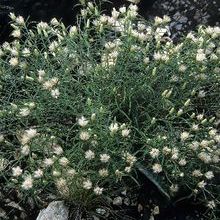UJ researchers discover new bacterial species with healthcare potential in South African medicinal plant
14 November 2023

Researchers from the University of Johannesburg have discovered a new bacteria species living inside an African medicinal plant, which may be found to have healthcare applications in future.
Prof Mahloro Serepa-Dlamini headed the team that isolated and identified the Bacillus dicomae sp. nov. species living inside an indigenous medicinal sub-Saharan plant, Dicoma anomala. She is the Head of the Department of Biotechnology and Food Technology at the University of Johannesburg (UJ).
The discovery is published in the International Journal of Systematic and Evolutionary Microbiology.
The Dicoma anomala plant is one of the commonly used medicinal plants in the southern African region. It is also known as fever bush. Traditionally it is used for treatment of diabetes mellitus by a cultural group in South Africa. It has also been researched by others for possible application against malaria.
The novel bacteria species the UJ researchers discovered, belongs to a group of bacteria (Bacillus cereus) with characteristics such as surviving heat, causing food poisoning, and causing pneumonia and heart disease in medical settings. Bacillus cereus bacteria are also commonly found in soil, the ocean, vegetables, meat and dairy products.
Some of the Bacillus cereus group members have benefits in drug development, food production, use as probiotics and as biopesticides.
However, when Bacillus cereus bacteria live inside a plant as endophytes, they help to protect the plant, and boost its growth without harming the environment. Endophytes are involved in the manufacture of the active ingredients inside medicinal plants.
The research team previously engaged with native South Africans who use the plant for tooth ache, diarrhoea, colic, and intestinal worms. That piqued their interest, says Serepa-Dlamini.
"The plant has various uses across different ethnic groups in South Africa. We wanted to see if we can find bacterial endophyte species living inside the plant - hoping that they manufacture some of the medicinal compounds found in the plant."
Their research is ongoing. Their work is now in a phase where they are exploring the biotechnological applications of Bacillus dicomae sp. nov. they discovered, adds Serepa-Dlamini.
"Novel bacterial species may possess unique biochemical properties, enzymes, or metabolites with potential applications in various industries, including pharmaceuticals, agriculture, food, and biotechnology.
"These discoveries can lead to the development of new products and technologies, driving economic growth.
"PhD student Ms Sephokoane Cindy Makuwa looked at the antimicrobial activity of the bacterium. Currently she’s assaying its spores for a formulation which can be used against pathogenic fungal species," adds Serepa-Dlamini.
Bacillus dicomae sp. nov. species is first novel bacterial species to be discovered and described by UJ researchers.
NOTES FOR EDITORS:
The full paper 'Bacillus dicomae sp. nov., a new member of the Bacillus cereus group isolated from medicinal plant Dicoma anomala' by Sephokoane Cindy Makuwa, Lesetja Raymond Motadi, Mpho Choene, Yang Liu and Mahloro Hope Serepa-Dlamini is published in International Journal of Systematic and Evolutionary Microbiology at the following:
URL: https://www.microbiologyresearch.org/content/journal/ijsem/10.1099/ijsem.0.006112
About the Microbiology Society
The Microbiology Society is a membership charity for scientists interested in microbes, their effects and their practical uses. It has a worldwide membership based in universities, industry, hospitals, research institutes, schools, and other organisations. Find out more at microbiologysociety.org.
For further information please contact [email protected].
Images from the University of Johannesburg
High resolution images of the dried plant, and the bacteria (all credited to University of Johannesburg) are available for download from this Google Drive folder without login or registration.
Image: SAplants, CC BY-SA 4.0
